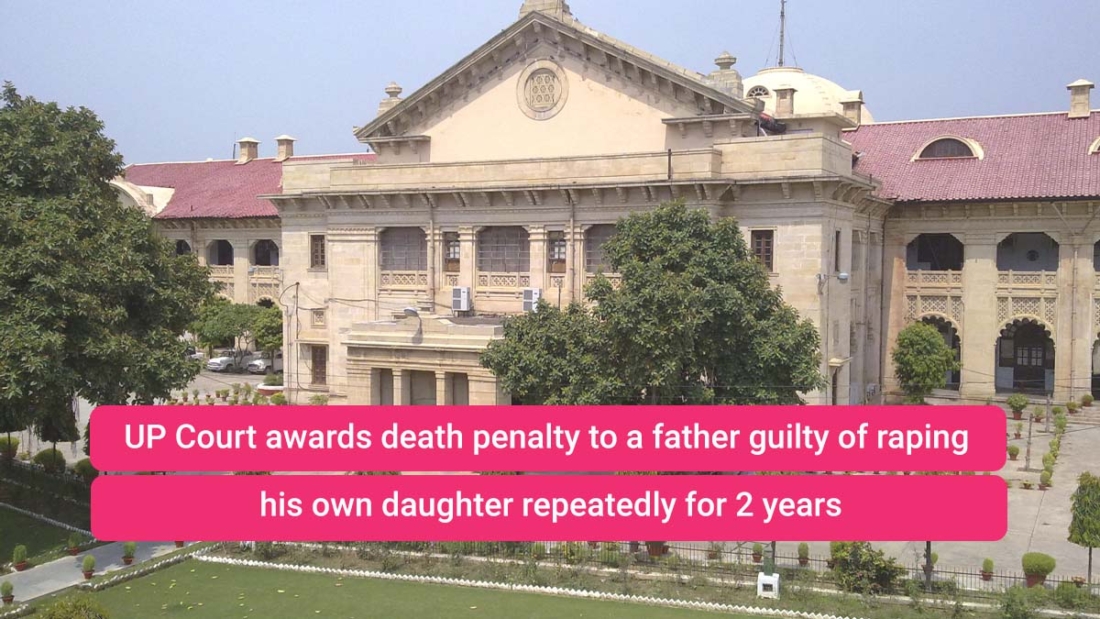Bahraich District Court of Uttar Pradesh, while delivering the verdict in a case where a 14-year-old girl had been repeatedly raped by her own father, one Nanhu Khan held that the case fell under the category of the ‘rarest of rare’.
Facts-
An FIR was registered based on the survivor’s mother’s complaint wherein she had alleged that her own husband, namely Nanhu Khan, had been forcibly raping her minor daughter continuously for the last two years. Police registered the case under Section 376 (3), 323, 506 of IPC and Section 5 and 6 (Aggravated Penetrative Sexual Assault) of the of the Protection of Children from Sexual Offences Act, 2012 (“POCSO Act”) against the accused and started the probe immediately. The probe got completed within 11 days.
The court of Nitin Pandey, Additional Sessions Judge, Fast Track Court (FTC) Rape and POCSO Act concluded the trial within a span of 7 days.
In its exhaustive 81 pages long judgment, instead of referring to the girl as victim, the court named her “Shuja” in pursuance of Apex court’s ruling in Nipun Saxena Vs. Union of India (2018).
Observations of the Court:
- Court pointed out that not only the girl was raped by her own father, but alsothe father had clicked her nude picture and blackmailed herand when the girl informed her mother about the crime, both were beaten up by the accused. It was also highlighted that though the accused got his minor daughter married during the Covid-19 lockdown period, still he kept on raping his daughter for two years and didn’t let Shuja go to her in-law’s house.
- It also came on record, that in his deposition, accused’s son (Shuja’s younger brother) had stated that he eye-witnessed his father raping his sister 3 or 4 times. In her testimony, Shuja had also stated that, ” Nanhu Khan, my father raped me several times and the first time he raped me, I felt immense pain but did not tell my mother because he had nude photos of me & often threatened to kill me.”
- It had also been submitted by Shuja that her father raped her when her family was away and sometimes gave her a “pill” that induced sleep. She had also stated that her father used to use some plastic thing before raping her.
- Taking note of the facts and circumstances and material on record, the Court remarked, ” The girl had been raped by someone who had her trust and being a minor, she could not have fought or resist her father.”
- While evaluating as to whether this case fell under the category of rarest of rare, the Court highlighted that it was a case where a father raped his natural minor daughter not only once but many times and observed that “Accused’s constant act of rape on his own daughter itself explains his bestiality and brutality.”
- In accordance with the principle established in the case of Mukesh & Anr vs State For Nct Of Delhi & Ors (Nirbhaya case), while analysing the aggravating and mitigating circumstances to hold the case as rarest of the rare, the court noted, “Undoubtedly, the situation for Shuja must have become such that she must have wanted to kill herself….the minor was being raped since the age of 13.”
- The court further remarked that there were no such mitigating circumstances that could bring the conduct of the accused out of the purview of the rarest of the rare.
The Court, therefore, held that “The crime committed by the accused continuously and the effect it has had on the victim and the society, brings the crime committed by the conviction in the purview of rarest of rare.”
Accordingly, noting that even after raping his daughter for the first time, there was no feeling of guilt and this act was done by him continuously, the court held the convict guilty for all the offences charged and awarded him the death penalty.
Further stressing that the fine of Rs. 50, 000 that had also been imposed upon the accused will not be sufficient to fulfil the lifelong financial needs of the victim child and her mother, the court further directed the District Legal Services Authority to take appropriate action to get the victim suitable compensation from State Government.
This judgment will now be referred to the High Court for confirmation of death sentence as per the requirement of section 366 of the Criminal Procedure Code, 1973.
– Vaishali Jain, Advocate & Associate – Child Safety at Work
 Cart is empty
Cart is empty 

